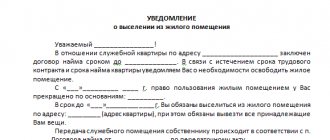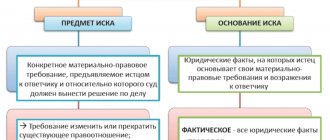The housing issue is an integral part of the legal sphere and is regulated by Housing legislation. They are inextricably linked with family relationships. When a marriage ends, it may be necessary to evict the owner's former family member .
Very often, people living together may at one point want to separate. And then the housing dispute will become an acute problem.
To resolve this situation, it is necessary to know the basics of participation in court, as well as the legislative framework of the Russian Federation. In addition, it would be useful to have information on how to file an eviction claim .
Owner's family members and former members
Initially, you should have a good understanding of marital relationships and their rights to property. To do this, you need to understand in detail who is and under what circumstances become former members upon termination of family relationships.
The designation of the members of the owner's family is covered by the Housing Code of the Russian Federation.
Four main groups are identified:
- Close relatives are people living with the owner of the apartment: his spouse, children, father and mother.
- The law also classifies family members as relatives of the owner, regardless of the degree of kinship, whom the latter has moved in with the rights of family members.
- The third option for relationships between loved ones, provided for by law, is cohabitation with disabled dependents, who automatically fall under the category of family members.
- An exceptional option: persons who are not actually direct relatives can also be classified as a family. In this particular version, long-term living in a civil marriage is implied.
An important factor is the common use of housing, while the rights of people living in a family are equated to the rights of the owner, unless otherwise determined by agreement between them (clause 2 of article 31 of the Housing Code of the Russian Federation).
The grounds for loss of status of family members may be factual or legal.
Legal grounds include the relationship itself, which ended for the following reasons: official divorce by the registry office, the court, recognition of the marriage as invalid.
As a result of such actions, one of the parties ceases to be part of the family and must leave the place of residence.
Factual circumstances include domestic disagreements among people living in the same place.
These include:
- disagreement to run a joint household;
- disagreements;
- lack of a common budget or everyday life to organize conditions for living together;
- departure/moving to another permanent place of residence.
To run a common household, you need to have an agreement or present this fact in conjunction with others. Otherwise, this fact will not be considered a valid reason for depriving the status of being part of the family.
Process initiator
In most cases, the real owner of the residential premises has the right to initiate the eviction process with subsequent appeal to the court. It is he who takes all the necessary actions to achieve the result.
But judicial practice also knows cases when third parties take the initiative for eviction. As a rule, these are relatives of the new owner, whose interests are infringed due to the residence or registration in the apartment of the former owners. These persons have the right to initiate the eviction process, since they live in the occupied territory and their rights have been violated in one way or another.
Rights of the owner of residential premises and grounds for eviction of a former family member
Clause 4 of Article 31 of the Housing Code of the Russian Federation is the main condition for the eviction of a former family member. The opportunity to use the presented housing is lost. However, it is impossible to evict a spouse before the actual divorce. The procedure requires the participation of the prosecutor when considering the case (Civil Procedure Code of the Russian Federation, Article 45, paragraph 3).
To revoke the status of being part of a family, a court decision is required. The owner does not have the right to independently expel a person who has ceased to be a family member.
He can exercise the right of ownership, dispose of the property in accordance with its purpose (residence, if the property belongs to the housing stock), and uses it in accordance with the requirements of the Housing Code of the Russian Federation (Article 30, paragraph 1).
In addition, Article 30 of the Housing Code of the Russian Federation provides for the right of the owner to determine who will live in a given premises.
State duty
There are two types of claims: property and non-property. The state fee for filing them is the same - 300 rubles for one demand (in our case, the eviction of the ex-spouse from the premises he occupies).
If you need to file not one, but two claims at once, read how to do this in the article “Statement of Claim for Eviction and Deregistration.”
Payment can be made in any convenient way. For example, through a cash register at a bank using a pre-printed payment slip. In addition, you can use online banking and payment terminals.
Details are taken from the office of the district court - they can be clarified at the information stand. An electronic version of the receipt for payment of the state duty is located on the official website of the court of your choice.
Eviction of the owner's family members
When the former spouse of the owner of the residential premises does not vacate him in accordance with paragraph 4 of Article 31 of the Housing Code, the owner can file a lawsuit demanding immediate eviction.
To do this, you will need to present to the court exhaustive arguments that will help make a decision in favor of the owner, which is provided for in paragraph 5 of Art. 198 Code of Civil Procedure of the Russian Federation.
Whether or not a claim is satisfied or not depends also on the defendant. The latter has every right to file a counterclaim. Based on the facts provided, the court will make an appropriate decision.
When going to court, it is necessary to take into account such factors as privatization, since the conditions provided for in paragraphs 2 and 4 of Art. 69 of the RF Housing Code may cancel this opportunity.
If the court has made a decision to resettle one of the residents, they are given a certain period of time to move.
The Housing Code provides in Art. 35 paragraph 1 and art. 31. clause 5, his right to use the premises is terminated, and he must leave the housing within a specified period of time.
Children
The 2005 edition of the RF Housing Code provides for the resettlement of all persons who cease to be family members. Oddly enough, this also extended to minors.
The eviction of children by the owner of a residential premises cannot be carried out according to the new versions of the legislation, or rather the amendments of 2009. Guided by the rights to protect the interests of the child, eviction can be avoided.
Grandchildren
When the question is about grandchildren who want to be evicted, the matter will depend directly on several factors:
- age – minor grandchildren cannot be evicted, since this would be a violation of the rights of the child (RF IC Article 56);
- circumstances – reason for eviction, situation with privatization;
- existence of a contract - signing an agreement for cohabitation.
If the grandchildren are already adults, then Art. 35 Housing Code of the Russian Federation. After the court hearing, the decision may well be on the owner’s side.
Moreover, a person who is no longer a family member will have to leave the premises within a time frame specified by the owner.
Therefore, the judicial eviction of the grandchildren of the owner of the residential premises is quite feasible, although there are many factors for making a court decision in favor of the apartment owner.
When cohabiting
An exceptional relationship option is civil marriage. Then the person has the opportunity to be called a family member, and the eviction of a common-law spouse (cohabitant) can cause some trouble.
The Housing Committee considers him a member of this unit of society and, in order to obtain satisfaction of the request, the court will be guided by the law.
To carry out the eviction procedure, it will be necessary to take into account such factors as the legality of his residence in the living space, and in addition, the legal regime of housing. In this variation, the owner can submit documents to the court stating that the cohabitant is not related to this property. In this way, claims to parts of the owner's property can be avoided.
You need to be prepared for the fact that the court will be guided by Article 31 of the RF Housing Code, which may serve in favor of the cohabitant. These types of cases are reviewed on a case-by-case basis, and the decision will depend on the evidence provided.
Content:
1. Is it even possible to file an eviction claim? 2. What are the chances of your eviction claim being successful? 3. How to justify your demand for eviction from an apartment? 4. Where to go for forced eviction?
According to Rosstat, every year in Russia more than 100 thousand people receive housing under social rent conditions [1]. Many of them tie the knot, and the spouses become family members, acquiring the same rights under the social tenancy agreement as the employer.
Meanwhile, more than half of marriages end in failure [2]. As a result, we are faced with a situation where people who are no longer connected by anything are forced to live together. None of them has any advantages due to the principle of equality established by Parts 2 and 4 of Art. 69 of the Housing Code of the Russian Federation.
Marriage is just a special case. Similarly, the tenant can move other people into the apartment as family members: mothers-in-law, brothers, sisters, nieces, friends, etc.
No matter how their relationship develops in the future, if everyone remains to live in a given living space, then it is almost impossible to deprive a neighbor of this right. However, if one of the tenants moves to another place of residence, then the prospect of his eviction from the apartment by court becomes real. You can learn about other ways to resolve housing issues from our video “Housing disputes (eviction, determination of the procedure for using an apartment, forced purchase of a share)”:
In this article, we will consider the main nuances associated with the proceedings of cases of eviction from a municipal apartment.
Former family members who cannot be evicted
The legislation of the Russian Federation also provides for cases when the severance of family ties does not serve as a basis for termination of residence in housing.
The category of those who cannot be evicted even after losing their status includes:
- spouses with whom this property was acquired;
- the shares were not distributed in court;
- there was no division of property.
Both parties have the opportunity to file a claim to allocate a portion to both equally. The court has the right to evict the non-owner only after providing him (her) with a new place to live or paying half the cost of the jointly acquired property.
What difficulties may arise
The landlord has the right to evict other tenants, but in some cases the court may refuse to satisfy the applicant's demands.
Thus, the court usually refuses the applicant if he intends to evict a citizen who belongs to the category of low-income people.
The owner of the property cannot evict:
- Persons who have not reached the age of majority. Also, the owner of the apartment will not be able to evict his ex-wife if she has minor children;
- Dependents who have lived with the owner for 1 year;
- Citizens who are disabled people of the first and second groups;
- People who retired due to reaching the legal age;
- Family members who refused privatization in favor of the owner. According to housing legislation, refusal of privatization guarantees a person a lifelong right to live in a dwelling, the privatization of which he refused.
Remember! When considering a dispute, the judge will also pay attention to:
- Availability of income of the evicted person and his financial situation;
- State of health of the person;
- Lack of alternative housing;
- Availability of rental housing.
In these situations, the court may refuse to satisfy the applicant’s demands, or it may oblige the owner to assist the former cohabitant in finding housing.
Retention of the right to use residential premises
The court may well make a decision in favor of the non-owner; in particular, temporary permission to stay in the owner’s house is allowed in some situations (Clause 4 of Article 31 of the RF Housing Code).
Let's list them:
- when the defendants do not have their own property;
- not being able to rent an apartment;
- no money to buy housing;
- disability of the defendant;
- job loss;
- other noteworthy circumstances.
The period of residence is completely determined by the court (clause 4 of article 31 of the Housing Code of the Russian Federation).
Judicial practice of eviction of a former family member
Precedents indicate that, for the most part, courts take the side of the plaintiffs. The persuasiveness of the statement of claim is added by arguments in favor of infringement of the rights of the property owner.
And also one interesting pattern can be traced. In most cases, defendants do not appear in court. Therefore, default decisions are often made.
Sometimes the court reserves for the other party the temporary right to reside in an apartment or house until the housing issue is resolved. At the same time, real deadlines are given in the decision.
Loss of the right to use residential premises
The owner of the apartment appealed to her ex-husband with a claim to recognize her as having lost the right to use the residential premises. The plaintiff emphasized that the apartment is her personal property, but her ex-husband continues to be registered there.
At the same time, the defendant does not live in the property and his personal belongings are not there. Therefore, the author of the claim insisted on its satisfaction.
The Novoilinsky District Court of Novokuznetsk, by its decision dated December 7, 2005 in case No. 2-2084/15, agreed with the applicant’s demands. As a result, the ex-husband lost the right to use the apartment.
Request for deregistration
Often, along with eviction, the question of deregistering the defendant at a specific address is additionally raised. The courts take the position that this requirement is unnecessary and cannot be satisfied.
As an example, we can cite the decision of the Klin City Court of the Moscow Region dated August 29, 2019 in case No. 2-1245/2019. He considered the claim to recognize the defendant as having lost the right to use the housing and to deregister it.
The document states that deregistration is not within the jurisdiction of the court. This procedure takes place on the basis of a decision on the main requirement put forward.
Counterclaim
The Kinel-Cherkassky District Court of the Samara Region considered the initial claim of a citizen against a relative for deprivation of the right to use residential premises. A counterclaim was also received to preserve the opportunity to live in the house for 3 years.
When considering the case, the court took into account the personal relationships of the parties to the dispute and the availability of other housing for the defendant. By decision of August 21, 2019 in case No. 2-770/2019, the initial requirements were satisfied.
At the same time, the defendant was given the opportunity to live for a month in the disputed territory. At the same time, the court considered the three-year period that the opponent in the dispute asked for to be too long.
Lack of registration in the disputed apartment
The plaintiff applied to the court to evict her ex-husband from her apartment. She indicated that, despite the divorce being filed, the man continues to occupy the living space.
He behaves aggressively and allows violence. Moreover, the defendant is not registered at the disputed address.
The facts stated in the claim were confirmed by witnesses. Therefore, by the decision of the Industrial District Court of Samara dated July 23, 2019, in case No. 2-3099/2019, the claims were satisfied in full.
Eviction of a common-law spouse
The essence of the matter: I.M. Petrov has personal living space. For a certain period he lived with his wife in an unofficial marriage. At the time of the trial, the relationship was no longer maintained, and the woman refused to move out. She is guided by the lack of another place to live. An eviction order is required.
Court: Guided by the Housing Code, namely Art. 31 clause 1. Due to the fact that many citizens live together without registering a relationship, but also have children and raise them. It would be, at a minimum, unfair to deprive common-law spouses of protection during a breakup.
The dissolution of family relations between such cohabitants cannot be taken as grounds for eviction of a former common-law wife. The court undertakes to analyze the possibilities for securing the right to use the disputed living space to the former family member.
How to justify your demand for eviction from an apartment?
Cases involving eviction from a municipal apartment require an extensive evidence base. It is not enough to simply file a claim where it will be written that the defendant moved out of the apartment a long time ago and therefore lost his rights to it. The plaintiff must prove the permanent and voluntary nature of the departure of the former family member.
There is no single list of evidence. Those that will be given below are only the most common, and not the only possible ones.
Firstly, the plaintiff must prepare all the documents that he has in his hands: a social tenancy agreement, receipts confirming his payment of utilities, a certificate of divorce, if we are talking about the eviction of a former spouse, etc.
Secondly, you need to think about how you can confirm the absence of the defendant in the apartment.
First of all, you should take care of the witnesses. It is better if these are not only the plaintiff’s relatives, but also some common acquaintances. The latter are more credible because they are assumed to be less interested in the outcome of the case. The optimal number of witnesses is from 3 to 5.
As practice shows, people usually hesitate in the courtroom and do not understand how detailed certain circumstances should be presented and what exactly is relevant to the case. In this regard, it is imperative to talk with everyone in advance. Practice speaking in court. There is nothing illegal about this. In preparation for trials, we always conduct educational work with witnesses.
What exactly can witnesses confirm? The time and circumstances of the defendant’s departure, the nature of the relationship that existed between family members, where he lives now (at least approximately), what he does, what his marital status is, etc.
Next, you should attend to the preparation of written evidence. Among them may be:
- an act of non-residence, which is drawn up with the involvement of neighbors and certified by the district police officer,
- a certificate from the district clinic confirming the absence of visits and calls,
- a certificate from the local post office, according to which the defendant does not receive correspondence addressed to him,
— an extract from the Unified State Register of Real Estate confirming the acquisition of another property by a former family member, etc.
Thirdly, in addition to the actual absence of the defendant from the disputed living space, it must be proven that there were no obstacles to his use. This will be helped by the district police officer’s report on the absence of appeals from the departing family member and data from the file of court cases on the absence of a claim for move-in or non-obstruction to the use of the premises.
We always help our clients in collecting the necessary evidence, so if you don’t fully understand what a particular document should look like and where you can get it, don’t worry - we’ll help you. As confirmation, we suggest that you read the review of our client in the case of eviction of the ex-wife:
When making a decision, the court takes into account the entirety of the evidence presented. Each of them in itself will not be a sufficient basis for satisfying the stated requirements. The more data supporting the plaintiff’s position is presented, the easier it will be for the court to rule in his favor.
If we still talk about the strength of evidence, then in the first place we would, perhaps, put witness statements and receipts confirming that the plaintiff pays for utilities. But this is by no means a call to abandon the collection of other evidence. The main thing is to follow the principle: you need to justify everything that is included in the subject of proof (see the end of the first section).
Stages of enforcement proceedings and eviction by bailiffs
The court verdict serves as the basis for enforcement proceedings in the eviction process. Only bailiffs have the right to enforce a court decision, guided by Federal Law No. 229 “On Enforcement Proceedings”. The FSSP service can only use legal methods in its work.
Enforcement proceedings are a labor-intensive procedure that also includes paperwork. To implement the resolution, several steps must be completed.
The defendant is given the opportunity to leave the premises on his own within five days. If this does not happen, a forced eviction to the street is carried out (Article 107 of Federal Law No. 229 “On Enforcement Proceedings.”).
Stage 1. Application to the bailiffs
The FSSP service receives a writ of execution upon completion of civil court proceedings (Article 30 of Federal Law No. 229). The applicant personally provides it to the bailiffs at the court office, who will carry out the eviction procedure.
When the plaintiff does not very well understand the system of interaction with the FSSP service, he has every right to convey the verdict to the chief bailiff. The latter must forward the decision to the management of the territorial body. The period for completing this task is no more than 5 days.
Provided that the applicant has not independently collected the writ of execution within a period of three months, the court sends it to the relevant authorities to put the sentence into effect.
Stage 2. Initiation of enforcement proceedings
The bailiff, guided by Art. 24 Federal Law No. 229 undertakes to inform the defendant about the initiation of enforcement proceedings.
The defendant is also given notice of the voluntary compliance with the court decision. The personal signature of the defendant on the specified document is mandatory.
The bailiff controls the process of execution/non-execution of the court decision. If it is ignored, the FSSP begins a forced ejection.
Stage 3. Notice to the defendant
The bailiff is guided by legal facts when executing a court decision, since the timely adoption of necessary measures is his main task. The work is determined by Federal Law No. 229 “On Enforcement Proceedings”.
Powers of the bailiff:
- calling the parties to the IP;
- requesting the necessary data within the framework of the case;
- the right to enter the premises occupied by the debtor;
- seize property.
According to the document in hand, the bailiff provides an eviction certificate.
Stage 4. Direct eviction
According to Art. 36 clause 1 of Federal Law No. 229, the bailiff sets the deadline for execution at two calendar months. In each specific case, the deadlines are set individually, but the requirements must be fulfilled within the specified time period.
Presentation of immediate execution is also provided. As a result, the former family member must comply with the decree no later than on the first working day after receiving the writ of execution.
Next, the defendant’s property is loaded and transported to the specified location.
The final stage of enforcement proceedings is its completion. In this case, a special resolution is issued, which marks the end of the enforcement proceedings.
Eviction Tips
When a situation arises that requires the removal of a person who is no longer a family member, the basic legal framework should be taken into account. To make the procedure more effective, you should adhere to the following recommendations:
- Consult with an experienced professional in these areas regarding your specific case.
- Check the basic facts that support your ownership of the living space.
- Collect the necessary documents and certificates that can prove your relationship to the plaintiff’s family.
- Follow the legal framework.
- Be careful when preparing all documents.
If your goal is to evict a former family member, you can download a claim form that meets all the requirements on our portal.
Author: Ekaterina Mikhailovna Gerasimenko, source.
Where to apply for forced eviction?
Consideration of eviction cases is within the jurisdiction of courts of general jurisdiction. You should contact the district court at the location of the property, because in this case the rule of exclusive jurisdiction applies (Part 1 of Article 30 of the Code of Civil Procedure of the Russian Federation).
If the current place of residence of the defendant is unknown, then what was known to the plaintiff as the last should be indicated - as a rule, this is the address of the disputed living space. Yes, most likely, the defendant will not receive notice of the summons to court and will miss the process. However, there is no flaw in this logic.
Registration provides information to all third parties about a person’s location. If for some reason he does not receive correspondence sent to such an address, then he is responsible for this (Part 1 of Article 1651 of the Civil Code of the Russian Federation).
Be prepared, however, for the fact that if the defendant does not appear at the trial due to failure to receive a subpoena, the period for consideration of the case will increase significantly, since in such cases the courts postpone court hearings twice in order to avoid challenging the decision in the future due to the lack of proper notification to one of the parties to the case.
To summarize, it should be noted that disputes about eviction from an apartment are among the most unpredictable and difficult to prove due to the absence of any clear algorithm of actions. They should pay great attention to evidence and to ensure that it meets such properties as reliability, admissibility and relevance. This must be done at the stage of consideration of the case in the court of first instance, since the appeal stage, as a general rule, does not provide for the possibility of presenting new evidence.
Below is an example of the successful implementation of an eviction by an employer of an ex-wife by the staff of our Laboratory:
The article was prepared taking into account the edition of regulatory legal acts in force as of October 3, 2018.
Author of the article: Maya Sablina, Director of the Law Laboratory
Sources:
[1] Housing conditions // Official website of the Federal State Statistics Service. URL: https://www.gks.ru/wps/wcm/connect/rosstat_main/rosstat/ru/statistics/population/housing/# (access date: 09/30/2018)
[2] Demography // Official website of the Federal State Statistics Service. URL: https://www.gks.ru/free_doc/new_site/population/demo/05-06.htm (access date: 09/30/2018)
Estimated cost of services to support cases of eviction from an apartment in the Maya Sablina Law Laboratory:
| № | Request | Cost, rub.) |
| 1. | Assessment of prospects for eviction from an apartment | 5 000 |
| 2. | Representation in court of 1st instance in cases of eviction from an apartment | 60 000 – 90 000 |
| 3. | Representation in cases of eviction from an apartment at the appeal stage | 30 000 – 50 000 |
We also recommend watching a video about the eviction of a former family member on our YouTube channel:
Don't be afraid to defend your rights and do it with us!









